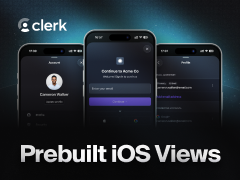By John Gruber

Clerk — Prebuilt iOS Views: drop-in authentication, profile, and user management.
Regarding the iPhone Keyboard
Monday, 5 May 2008
Coming from the aptly-named BlackBerry enthusiast site CrackBerry, I was intrigued by this list of “Top 10 Reasons the iPhone Is No BlackBerry”. Never having used a BlackBerry, I don’t know as much about them as I’d like — I’m generally wary of spouting off regarding things I’ve never used. But this list is weak sauce.
A few items are reasonable — e.g., video recording,1 VOIP for Wi-Fi, and GPS — but they’re also exactly the sort of things the iPhone seems likely to support in the not-so-distant future. (VOIP for Wi-Fi seems like a sure thing once the iPhone App Store hits the street.) Other items on the list are just sad — #10 is that the iPhone is harder to use one-handed and therefore not usable while driving a car. And #1, bafflingly, is “The iPhone Third-Party Apps Debacle”:
Sure the iPhone SDK has been released, and there might be some great apps in the works, but in my opinion, that’s too little, too late, as they say.
Methinks Al Sacco, the author of this CrackBerry list, is deeply misinformed regarding the imminent iPhone apps market, but we’ll know the answer for certain in a few short weeks, so there’s no use spilling pixels over it here.
The item on the list that interests me is #2, regarding the iPhone’s lack of a physical keyboard — clearly a fundamental difference between the two platforms, and a subject of debate ever since the iPhone was unveiled.
One thing worth noting is that there doesn’t seem to be any measurable demand at all from current iPhone owners for a physical keyboard on future iPhone hardware. My own opinion is simply that the iPhone keyboard works a lot better than I expected it to. But, never having owned a phone or PDA with a BlackBerry-style QWERTY keyboard, I’m in no position to compare.
This, to me, is the question: What do iPhone owners who do have experience using phones with physical keyboards think? So I asked just that on Twitter, generating two threads of replies: here and here. I encourage you to read them yourself.
The general consensus:
It really does take a week or so to get the hang of the iPhone keyboard, and about a month to get good at it.
Most admit the iPhone’s keyboard isn’t quite as good as a physical one, but once used to it, it’s good enough to be happy.
A few claim to type faster on the iPhone. A handful, like Dori Smith and Alex King, admit to still using both regularly, and those people tend to like the iPhone keyboard the least. (I suspect the only way for someone accustomed to a BlackBerry-style keyboard to get used to the iPhone keyboard is to switch full-time. The necessary muscle memory is too different.)
In short, even iPhone users who previously owned phones with physical keyboards seem happy.
But here’s the rub: if it takes a week of use to get the hang of the iPhone keyboard and a month to get good at it, how does Apple convince a current BlackBerry/Treo/Sidekick/BlackJack/whatever owner who is particularly skeptical about the keyboard? A few minutes pecking away on a demo unit in an Apple Store are likely to yield disappointing results.
E.g., Laura Lemay, who responded thusly:
Do you want actual iPhone switchers, or people like me who really want to like the keyboard but don’t and therefore won’t switch?
That’s not to say that everyone who won’t switch because of the iPhone’s keyboard would, if they did switch, grow to like it. The point is that some who would will never know because they won’t buy an iPhone in the first place because they don’t think that they would. “It takes a couple of weeks to get used to it” means you’ve got to take it on faith.
In the grand scheme of things, the pocket of iPhone resistance comprising people currently using physical-keyboard phones is not that big a deal. Apple is looking at the iPhone market as iPod-sized: 100 million phones in the next five years or so. The grand total of existing smartphone users pales in comparison. Even if there’s not a single already-using-a-smartphone user left who is going to switch to an iPhone, it wouldn’t prevent the iPhone from being a mass market success. Most iPhone users — and especially most future iPhone users — are coming from regular mobile phones with numeric keypads. And no one can argue that typing on the iPhone doesn’t beat the pants off gimmicks like T9.
But, in the near term, I do think Apple covets BlackBerry switchers in particular. Everything about the enterprise features that Apple has announced for the upcoming iPhone 2.0 software seems catered to appeal to BlackBerry users. The keyboard is perhaps the single biggest advantage RIM has with these customers. I do not think Apple is going to release an iPhone with a physical keyboard (“iPhone Enterprise”?), but if they did, it’d be one of those Steve Jobs “a year ago he said these things were crap and now he’s telling us this one’s awesome just because it’s from Apple” moves that drive some people — bless their hearts — spittle-flying-out-of-their-mouths crazy.
-
I bought a $135 Flip Ultra video camera at the end of March, and have subsequently fallen in love with it. But it strikes me that an iPhone with video recording and a slightly better lens (than the current iPhone) could completely obviate the need for a Flip. ↩︎
